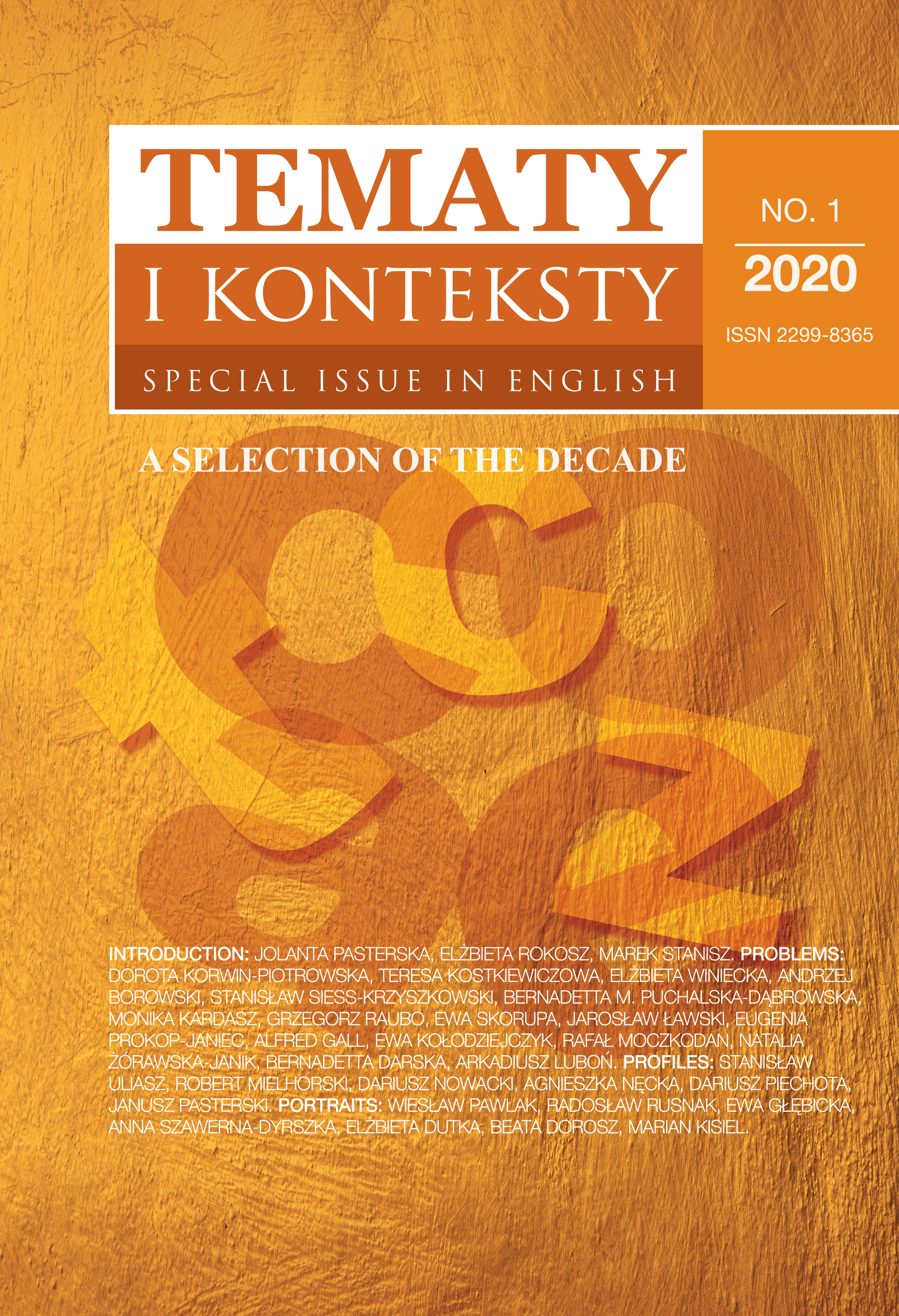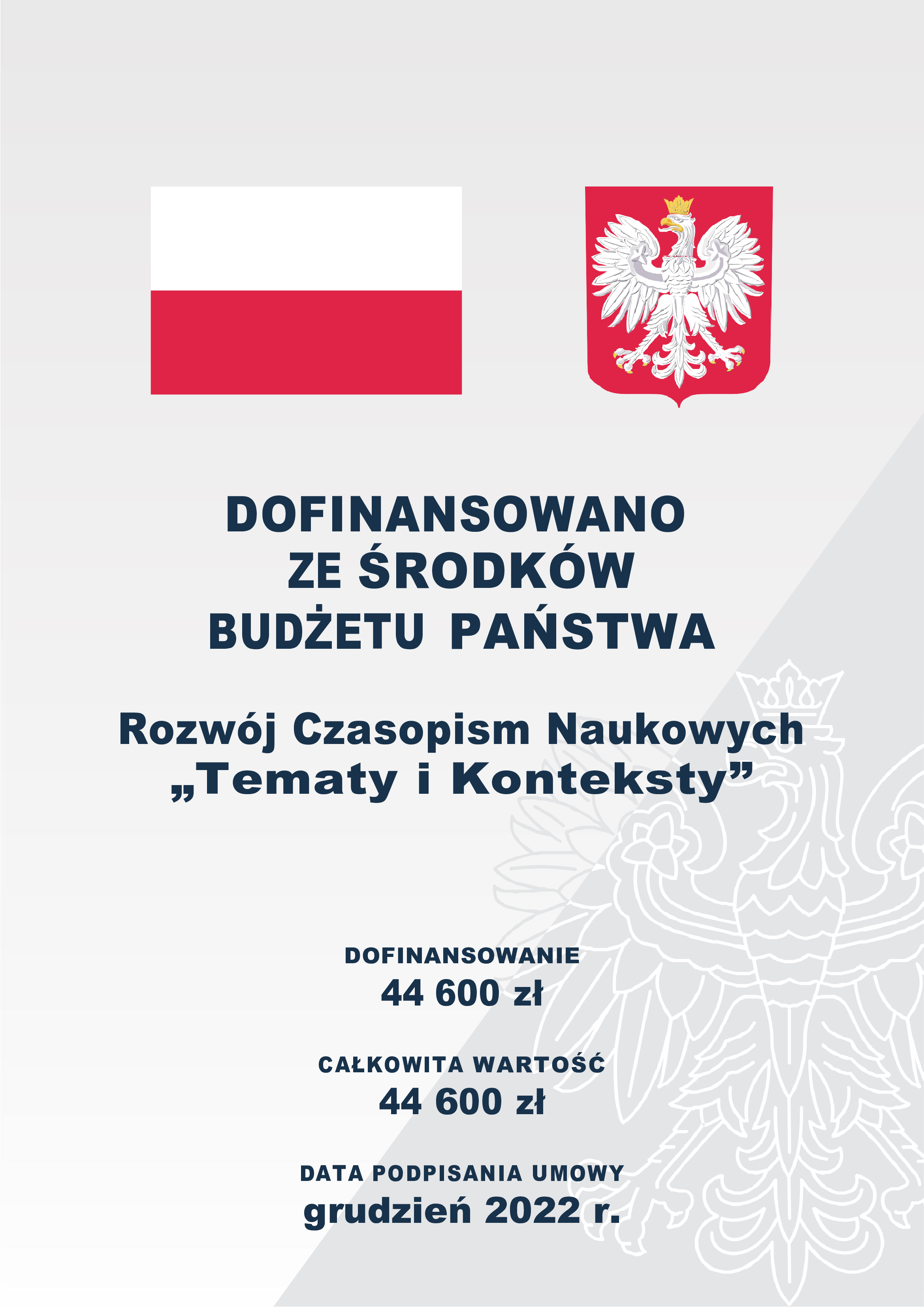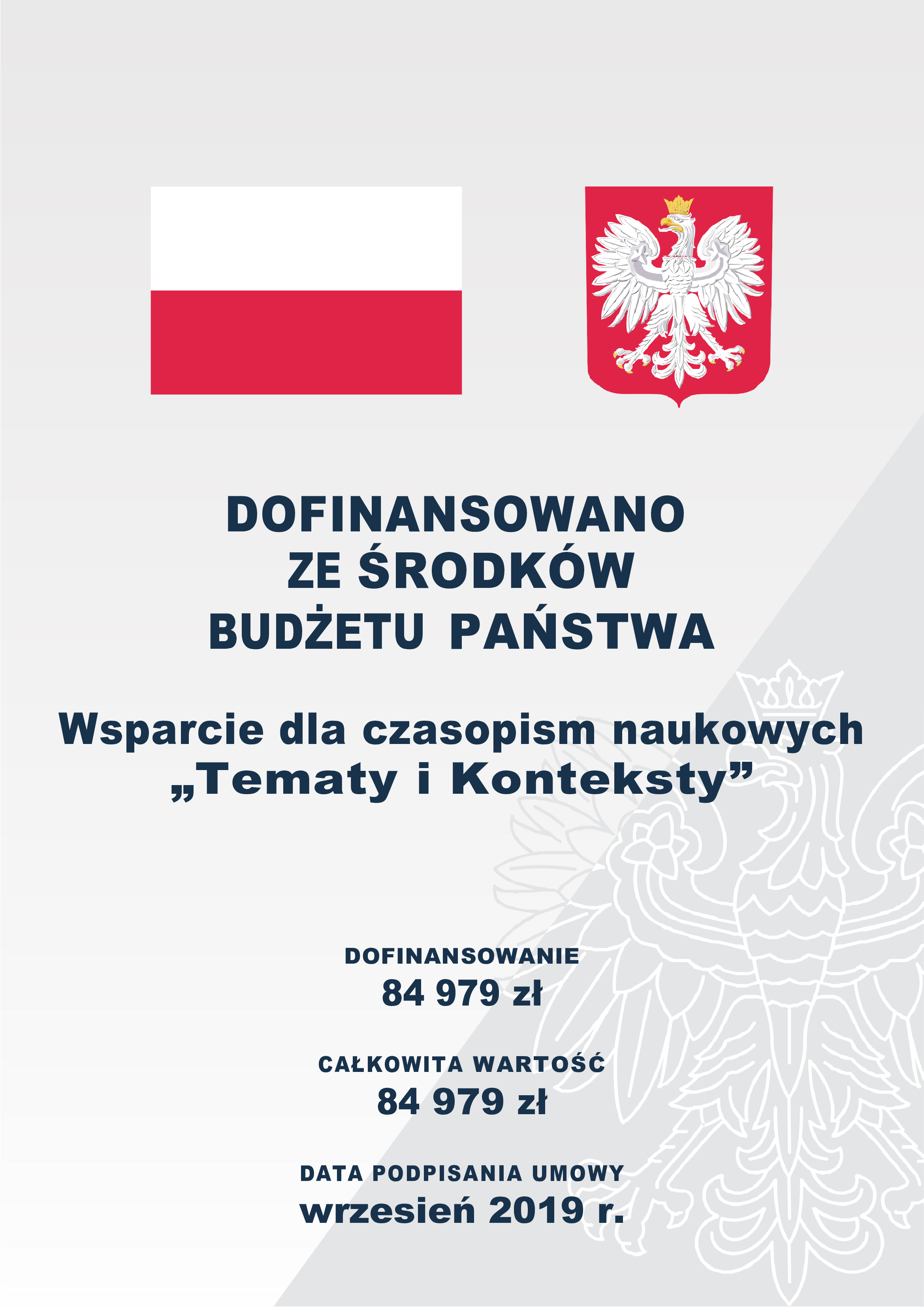Centenarian Weird Fiction from Providence in Contemporary Poland. Translational Models and the Reception of Short Stories by Howard Phillips Lovecraft – the Case Study of Dagon
DOI:
https://doi.org/10.15584/tik.spec.eng.2020.17Słowa kluczowe:
translational convention, translational reception, weird fiction, horror novelAbstrakt
The article discusses the conventional models and translation techniques, which are most common among the Polish translators of the weird fiction by Howard Phillips Lovecraft. The proposed classification of such models, aimed at either “popularisation,” “stereotypisation” or “revision” of Lovecraft’s short stories, presents the impact of extra-textual factors (vision of the writer, target group of readers, cultural and political influences) on the content, language and style of translated works by the American author. The comparative analysis takes into consideration one of the early short stories by Lovecraft, Dagon (1917), and its Polish versions by Arnold Mostowicz (1973), Robert Lipski (1994) and Maciej Płaza (2012).
Downloads
Bibliografia
Gemra A., “Góry w horrorze i fantasy. Rekonesans,” in: Góry, literatura, kultura, Vol. 4, edited by J. Kobuszewski, Wrocław: Wydawnictwo Uniwersytetu Wrocławskiego, 2001.
Gunn J., Droga do science fiction, Vol. 2: Od Wellsa do Heinleina, Warszawa: Wydawnictwo “Alfa”, 1986.
Houellebecq M., H. P. Lovecraft – Przeciw światu, przeciw życiu, translated by J. Giszczak, Warszawa: Wydawnictwo W.A.B., 2007.
Joshi S.T., A Subtler Magic: The Writings and Philosophy of H. P. Lovecraft, Berkeley: Wildside Press, 1999.
Joshi S.T., H. P. Lovecraft. Biografia, translated by M. Kopacz, Poznań: Wydawnictwo Zysk i S-ka, 2010.
Joshi S.T., “Six Views of Lovecraft,” Lovecraft Studies 1990, No. 22-23.
Joshi S.T., “Wywiad z okazji premiery książki ‘H. P. Lovecraft: biografia’,” interviewed by M. Kopacz, Biuletyn Carpe Noctem 2010, No. 1.
Joshi S.T., Schultz, D. An H. P. Lovecraft Encyclopedia, Westport: Hippocampus Press, 2001.
Kałużyński Z., Listy zza trzech granic, Warszawa: Wydawnictwo Czytelnik, 1957.
King S., “Poduszka Lovecrafta” [“Lovecraft’s Pillow”], in: M. Houellebecq, H.P. Lovecraft – Przeciw światu, przeciw życiu, translated into Polish by J. Giszczak, Warszawa: Wydawnictwo W.A.B., 2007.
Kołyszko M., Groza jest święta, [e-book, no place of publication] 2014.
Kopacz M., “O biografii Lovecrafta od tłumacza słów kilka,” Biuletyn Carpe Noctem 2010, No. 1.
Kopacz M., “‘Odrażający, bluźnierczy Necronomicon,’ czyli o polskich przekładach Lovecrafta,” Czas Fantastyki 2010, No. 2(23).
Krawczyk-Łaskarzewska A., “Pomiędzy wiedzą a grozą – Hawthorne, Gilman, Bierce, Lovecraft,” in: W kanonie prozy amerykańskiej, edited by L. Aleksandrowicz-Pędich, Vol. 2: Z placu Waszyngtona do Domu z liści, Warszawa: Wydawnictwo Szkoły Wyższej Psychologii Społecznej “Academica,” 2009.
Kwaśna K., “The Concept of Equivalent Effect in Translation of Howard Phillips Lovecraft’s Works,” in: Poe, Grabiński, Ray, Lovecraft. Visions, Correspondences, Transitions, edited by K. Gadomska, A. Loska, Katowice: Wydawnictwo Uniwersytetu Śląskiego, 2017.
Lovecraft H.P., Coś na progu [The Thing on the Doorstep], translated into Polish by R. Lipski, Poznań: Wydawnictwo Zysk i S-ka, 1999.
Lovecraft H.P., Dagon, translated by R. Lipski, Warszawa: Wydawnictwo S.R., 1994.
Lovecraft H.P., Koszmary i fantazje. Listy i eseje [Nightmares and Fantasies. Letters and Essays], translated into Polish by M. Kopacz, Kraków: Wydawnictwo Sine Qua Non, 2013.
Lovecraft H.P., Najlepsze opowiadania, edited by S.T. Joshi, Vol. 1, translated by R. Grzybowska (et al.), Poznań: Wydawnictwo Zysk i S-ka, 2008.
Lovecraft H.P., Nienazwane [The Unnamable], translated into Polish by K. Maciejczyk, Toruń: Wydawnictwo C&T, 2017.
Lovecraft H.P., Weird Fiction – Nie budź drzemiących demonów, Warszawa: SFAN-Club, 1981.
Lovecraft H.P., Zew Cthulhu [The Call of Cthulhu], translated into Polish by R. Grzybowska, Warszawa: Wydawnictwo Czytelnik, 1983.
Lovecraft H.P., Derleth A., Obserwatorzy spoza czasu [The Watchers out of Time], translated into Polish by R. Lipski, Poznań: Wydawnictwo Zysk i S-ka, 2000.
Lovecraft H.P., “Okropność w Dunwich” [“The Dunwhich Horror”], translated into Polish by F. Welczar, Przekrój 1967, No. 12-13(1145-1146).
Lovecraft H.P., “W otchłani” [“Dagon”] translated into Polish by A. Mostowicz, Ty i ja 1973, No. 7.
Lovecraft H.P., Zgroza w Dunwich i inne przerażające opowieści [The Dunwhich Horror and Other Stories], translated into Polish by M. Płaza, Poznań: Wydawnictwo Vesper, 2012.
Łyp Ł., Main Characters of the Cthulhu Mythos in Howard Phillips Lovecraft Stories, Rzeszów−Kraków: Wydawnictwo Mitel, 1999.
Mikulski J., “Howard Phillips Lovecraft: autor, dzieło i jego recepcja wydawnicza w Polsce. Zarys problematyki,” Acta Universitatis Wratislaviensis. Studia o Książce i Informacji 2013, No. 32.
Misterek D., “Typy przestrzeni w prozie Howarda Philipsa Lovecrafta,” in: Literatura i kultura popularna, edited by T. Żabski, Vol. VII, Wrocław: Wydawnictwo Uniwersytetu Wrocławskiego, 1998.
Nelson V., Sekretne życie lalek [The Secret Life of Puppets], translated into Polish by A. Kowalcze-Pawlik, Kraków: Towarzystwo Autorów i Wydawców Prac Naukowych Universitas, 2009.
Orliński W., Ameryka nie istnieje, Bielsko-Biała: Wydawnictwo Pascal, 2010.
Poe, Grabiński, Ray, Lovecraft. Visions, Correspondences, Transitions, edited by K. Gadomska, A. Loska, Katowice: Wydawnictwo Uniwersytetu Śląskiego, 2017.
Radecki Ł., “Ojcowie horroru: Howard Phillips Lovecraft,” part 2, Czachopismo 2007, No. 3.
Welczar F. [W. Błońska-Wolfarth], “Fascynujący autor Howard Philips Lovecraft,” Przekrój 1967, No. 12-13.
Wielka księga strachu, edited by X. Valls, translated by E. Morycińska-Dzius, Poznań: Wydawnictwo Media Rodzina, 2008.
Wiśniewski M., “Świat Howarda Philipsa Lovecrafta w ujęciu religioznawczym,” Humaniora. Czasopismo Internetowe 2013, No. 1.
W kanonie prozy amerykańskiej, edited by L. Aleksandrowicz-Pędich, Vol. 2: Z placu Waszyngtona do Domu z liści, Warszawa: Wydawnictwo Szkoły Wyższej Psychologii Społecznej “Academica,” 2009.
Wydmuch M., “Cień z Providence,” in: H.P. Lovecraft, Zew Cthulhu, translated by R. Grzybowska, Warszawa: Wydawnictwo Czytelnik, 1983.
Wydmuch M., Gra ze strachem, Warszawa: Wydawnictwo Czytelnik, 1975.
H. P. Lovecraft. Polski serwis, http://www.hplovecraft.pl (accessed on 20. 11. 2017)
The H. P. Lovecraft Archive, http://www.hplovecraft.com (accessed on 20. 11. 2017)
Wikipedia, https://pl.wikipedia.org/wiki/H.P._Lovecraft (accessed on 20. 11. 2017)
Pobrania
Opublikowane
Jak cytować
Numer
Dział
Licencja
Prawa autorskie (c) 2021 Tematy i Konteksty

Utwór dostępny jest na licencji Creative Commons Uznanie autorstwa – Użycie niekomercyjne – Bez utworów zależnych 4.0 Międzynarodowe.




